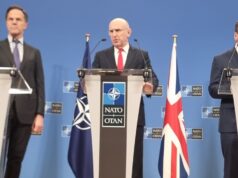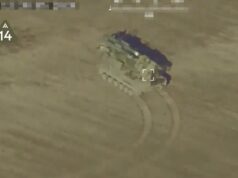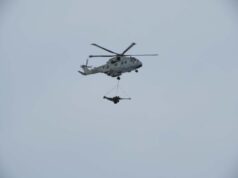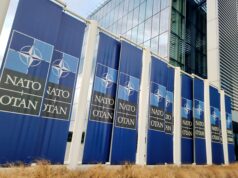In a recent exchange in the House of Commons, Graham Leadbitter, the SNP MP for Moray West, Nairn, and Strathspey, expressed concern over the government’s lack of a clear timeline for meeting the 2.5% of GDP target for defence spending.
Leadbitter criticised the government’s commitment, particularly in light of the current global security situation. “Defence professionals across Whitehall will have their heads in their hands at this Government’s commitment to 2.5% at some point and when fiscal conditions permit,” Leadbitter said.
“To fail to commit on defence investment with the multiple security threats facing us, from the Ukraine war to the Middle East and a plethora of global cyber-threats, is strategically illiterate.”
He continued, highlighting the urgency of the matter. “Those threats will not wait for the Chancellor to get a grip,” Leadbitter argued. “So what urgent steps will the Secretary of State take with the Chancellor to ensure at least the 2.5% promised by the Labour party on defence is spent when the threat assessment demands it, which is now, and not when the Chancellor feels it to be convenient?”
In response, Defence Secretary John Healey acknowledged the concerns raised by Leadbitter but reaffirmed the government’s position. “Mr Speaker, I am going to take what I can from the hon. Gentleman, which is an SNP welcome and an urging for an increase in defence spending,” Healey replied.
“That will happen under a Labour Government. The Scottish workforce, the Scottish military and the Scottish-based military will play an important part in the defence of this country in the future.”













SNP are making a good point. Wish we could smash in a good 5% but that will never happen.
Binning the triple lock would get us that money overnight.
This obsession with an arbitrary target of 2.5% of GDP diverts attention from 2 things.
First, it wouldn’t represent a budget increase large enough to materially expand all our armed forces. To achieve that we would need to spend much more.
Second, it gets in the way of our defining clearly what we absolutely need to do in order to enhance our own defence. Until that is done, there is little point pushing for more money than is required to keep existing assets functioning and contracted new ones delivered on time.,
I agree, that’s why a proper defence review is needed and we need a proper (national) debate about just what we want and need our armed forces and industry to do. Otherwise, we have no clear view of what we’re trying to achieve (and what we need to achieve it).
In the absence of this, we just seem to divide our procurement spend by 3 and hope for the best.
I was struck by a suggestion I saw elsewhere – of using increased defence spending to drive the development and growth of the UK’s technological and industrial base. This could potentially have knock-on benefits for civilian markets.
I have no idea how much knock-on benefit this would have but it may help generate a whole range of UK tech companies in other sectors. In that case, you could start to think a broader economic return from increased defence spending. It wouldn’t just be a cost.
Given the Labour Party’s interest in an industrial strategy, this seems like a no-brainer to me.
This presupposes that MOD wouldn’t screw it up of course but that shouldn’t be a reason not to consider it – it took the Royal Navy many many years of trial and error before they were good enough to beat the Dutch.
This is also a bit like recognising that public services like Education and the NHS aren’t necessary evil- they’re actually an investment for developing and maintaining a capable and trained workforce. Like Defence related industries, they’re strategic capabilities.
The last thing we want is a national debate – that will just waste time trying to engage the public in a debate they are simply not interested in. They espect the UK to be defended adequately – nothing more nothing less. What we need is for the military to dictate their needs and priorities and for the chancellor to fund those priorities. All of them.
Unfortunately, a national debate will only happen if the state of our military is widely accepted and understood. It would take a successful attack on our interests to provoke such a situation. I hope that never happens.
I take the points about a ‘national’ debate leading to more delays. However we get there, I just want us all to understand what we actually need defence-wise, something that is service agnostic.
Is the ability to launch strikes on faraway countries necessary for our defence? If it is, is it more or less important than being able to defend the UK from direct conventional attacks (or NBC ones for that matter!)?
Russia appears a core threat to us. We all know this but in what way are they they a threat to us and what might be do about it? If it’s a choice between ASW capability or land forces in the Baltic, which is a better use of our resources?
I’m not proposing answers; I just feel that we seem to run around in circles as we’re not clear on the why, what, where and how of our defence strategy?! 🙂
To my mind, Finland is a good example of a country with a very clear view on what ‘defence’ means for them. As a result, they are able to hone a very clear set of capabilities to meet this vision.
I agree. The Integrated Review really failed to focus on the main threats we need to counter. As a result the following Defence Command Paper seemed muddled and incomplete. What we have continued to choose is a bit of everything and always in smaller numbers than before. So there is a palpable sense of continuing decline.
The only way to stop this is to make hard choices about what we need. Anything outside the core requirement gets deleted to allow the core to expand.
Your point about ASW vs land forces in the Baltic is a good one. I fear any politician would answer ” both” and fund neither properly. My answer is that we prioritize what is most useful for us- there is no NATO obligation to build capabilities primarily for the benefit of other members;
Guess I’ll have to re-read IR 2023. I do recall it seemed very vague. Counting an IR plus DCP as not so different from an SDR/SDSR, in what it seeks to achieve, it is quite frustrating that this iteration is the 3rd process since 2021. They do consume a lot of time, especially the current one.
Is the ability to launch strikes on faraway countries necessary for our defence?
When you say ‘our’ defence it needs a little unpacking. I contend that we might have to launch strikes against faraway countries or to deploy force over distance to confront those faraway countries….or both.
We are a NATO nation and NATO’s remit is to provide deterrence across the Euro-Atlantic region and to fight if deterrence fails, ergo we need to be prepared to fight a distantly located opponent, such as Russia – and engage in the near, deep and rear battle.
The 9/11 attack led to calling up of NATO’s Article 5, hence we went to war in Afghanistan. So we had to project power over to that country.
We also have security responsibility for the BOTs, one of which is 8,000 miles away. If Argentina again threatened to invade again, then we would have to launch combat power across that 8000 mile distance, and next time might have to engage targets on the Argentine homeland.
Increased defence spending needs to provide more things that go bang and kill our enemies more effectively than they can kill our troops. Any benefits to the industrial base is a bonus but should not be prioritised over turning our military into an effective killing machine. When the shit hits the fan all that matters is having the kit available, where its made is irrelevant.
Until you need a spare part. Then it’s very relevant.
Sorry but whole nations win the wars that “matter existentially” not any peacetime army. Peacetime forces really have 4 purposes
1) undertake peacetime related security taskings including training.
2) show deterrent in an attempt to prevent war
3) fight minor wars related to maintaining national interest
3) incase of a full peer war that is an existential threat to the nation, sacrifice itself to give the nation time to fully mobilise.
every major war our nation has ever won has not been with the armed forces it started with. Infact pretty much every major war sees the professional peacetime armed forces destroyed and or remade into a wartime force. It’s the nation that can remake its armed forces faster and more effectively that wins. As an example If Russia does win the Ukraine, it will be with a completely different army than it first invaded with..
Nations win wars by driving their enemies to strategic exhaustion…the reason people are starting to worry that china could possibly in the end beat the US is because if the PLAN and USN engage in mutual bloodbath in the western pacific and gut each other..China could win because it has 260 times the ship building capacity of the US and could rebuild a navy in a few short years where as US industrial capacity would take many decades to rebuild a gutted USN.
The Second World War was won by the massive overwelm of the allies industrial capacity, the allies peacetime armed forces pretty much crumpled and just hung on to give time against the third Reich and axis powers. Britain controlled and in the end outlasted Napoleons empire due to economic output and generating trade income that allowed it to build the biggest navy in the world and essentially fund the armies of every nation that apposed Napoleon…Napoleon spent years kicking the shit out of the allied and British armies before essentially Britain strangled him economically.
Think we all know 2.5% no great shakes really it’s got to be at least 3% even this is to small for the unstable world at the moment.
Increasing spend from 2%to 2.5% achieves very little, far better to look at getting bang for buck.
When you look at our spend we’re up there at the top of the pile, but what we actually get in return is pathetic.
Time for a totally different approach, think outside the box, these are unprecedented times, we can’t just have the spend being a shop window for our defence industry.
Bloody hell, never thought I’d see the day I’m agreeing with the SNP!
Tax doctors and train drivers more ..say 22% more they can afford it .. apparently that’s enough money for 10 more type 26 each year .
By two car ferries as ordered by the SNP should push it through three percent.
Don’t worry, Trump will get it to 3% once he has had his first NATO meeting.
Politicians should define their defence strategy and the services then deliver the force structure to support that vision – Rather than the treasury/ministers dictating you have X £. Currently our forces are in a parlous state. It will take at least five years to rebuild them and the necessary sovereign manufacturing capabilities. The US is rapidly being caught up by China; with one shipyard outproducing the whole of the USA., automated cruise missile factory capable of manufacturing hundreds of thousands of missiles per year.. The question is when, not if China expands its empire. America is a fading empire and will not be capable of stopping China.
Touch of hypocrasy here methinks. SNP want independence, but expect the rest of the UK to provide them with security?
An independent Scotland would be left with its trousers round it’s ankles. No UK, no NATO, no armed forces…. The SNP charlatans have not thought it through AGAIN!